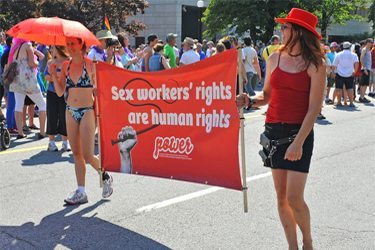Steps Forward—and Setbacks—for Sex Workers’ Rights
This summer, the effort to pass the Women's Equality Act in New York and the Supreme Court's decision involving the anti-prostitution pledge that applied to global funding to fight HIV and AIDS had implications for sex workers' rights.

This summer was a busy one for issues relating to sex work and trafficking in persons. In late June, the New York state legislature, despite much advocacy and pressure, did not pass Gov. Andrew Cuomo’s ten-point Women’s Equality Act (WEA) into law. Cuomo had hoped to use the WEA as a multi-platform law that would advance the rights, health, and well-being of women across a number of critical concerns. He brought together issues around reproductive rights, workplace discrimination, and trafficking in persons under one umbrella. The effort supported the fact that these different aspects of gender equality are inherently tied together.
Around the same time, the U.S. Supreme Court announced its ruling in a case involving the anti-prostitution pledge that applied to global funding to fight HIV and AIDS. The Court made its decision on First Amendment grounds, stating that Congress can use the money it spends to prioritize certain types of goals and programs over others, but it can’t go so far as to require groups receiving grants to actually adopt and voice a particular viewpoint. This was an important and crucial decision, both because of the impact it had on health and empowerment programs around the world, and because the Court’s logic and reasoning did not focus on hysteria and false morality about sex work, but on the potential limits of government action in the context of free speech.
These developments in law and policy on issues relating to the rights and health of sex workers offer a window into the current arc of the movement for sex workers’ rights. While both addressed important issues of the day that affect all of us—not just sex workers and their allies—like HIV and trafficking in persons, they played out in very different ways.
The Women’s Equality Act has been very much removed from the sphere of sex workers and their rights, health, or empowerment. The WEA affected sex workers in that one of its goals was to strengthen human trafficking laws, but the bill language focused almost exclusively on criminal penalties on prostitution. While every law can be improved and developed in new and innovative ways, there was little recognition that New York already has one of the strongest anti-trafficking laws in the country; it includes appropriate penalties and offers needed services to survivors.
Initially, it was a challenge for anti-trafficking advocates who did not have an anti-prostitution agenda to get information on the WEA language. So not only were sex workers left out of advocacy on a bill that affected them directly, but even advocates who either support or have neutral positions on the rights of sex workers were considered outsiders.
Ultimately, the WEA failed because of its provisions on abortion—possibly the only issue more controversial and alienating than the rights and dignity of sex workers—but it was clear that the concerns and voices of all women were not going to be given equal weight when it came to trafficking in persons, which certainly won’t be stopped through criminal laws targeting prostitution.
The anti-prostitution pledge, in contrast, was introduced about a decade ago, and sex workers, public health advocates, and human rights lawyers worked together in different ways to document and publicize the dangers of a policy that required the very organizations offering help to sex workers to denounce them. The advocacy was not always seamless, and the culmination of this case in a Supreme Court decision based on the First Amendment, rather than on the rights and dignity of sex workers, reflects that. Sex workers’ rights advocate Tracy Quan notes, “Without sex workers diligently building a movement over many decades, this lawsuit would not have happened. Sex workers have been loudly protesting the anti-prostitution pledge since 2003, but our involvement in the Supreme Court challenge was carefully handled and rather muted.” The efforts were far from perfect, and the decision itself only affects U.S.-based recipients of funding, but it was always clear that sex workers would and should have a voice in the debate.
Everyone should have a fair chance to thrive and pursue opportunities in life. When people are trafficked, they are forced, tricked, or coerced to perform work against their will. Trafficked persons are made to live in a climate of fear. They often experience isolation and invisibility, are subjected to abuses of power by their employers, and have little or no access to help.
We need solutions that support the real needs of trafficking survivors, and of people at risk for HIV. Sex workers are making enormous progress in terms of advocacy and policy impact. But there is still a long way to go. As long as we do not examine our sexual attitudes and the policies that stem from a misunderstanding of our rights around sexual behavior and how to protect them, policymakers will continue to confuse sex work with trafficking and implement harmful policies on HIV without consequence for themselves. Sex workers’ rights advocates have an opportunity over the coming years to keep policymakers on their heels as we continue to build this strong global movement and bring to fruition the actual needs, lives, and dignity of sex workers everywhere.

